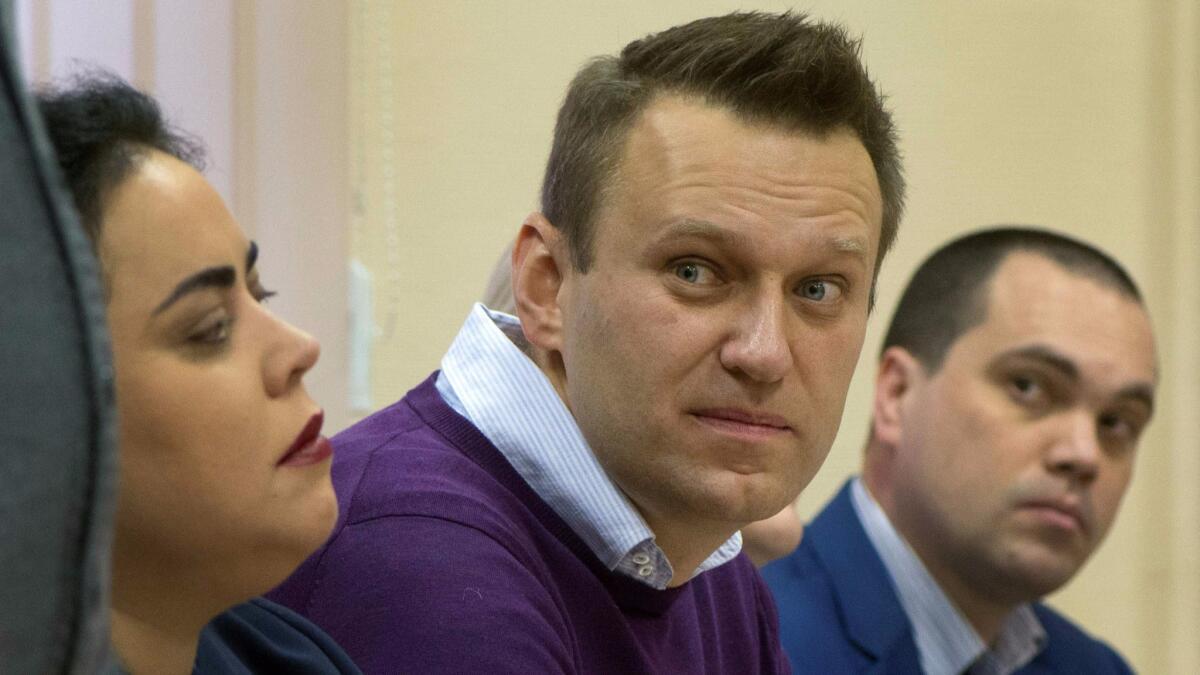Russian opposition leader found guilty of embezzlement; his lawyers pledge to appeal

A Russian opposition leader who planned to challenge President Vladimir Putin in next year’s election was found guilty Wednesday in the retrial of a 2013 fraud case, formally eliminating him as a candidate.
A Kirov court judge found Alexei Navalny, 40, guilty of embezzlement and pronounced him the head of a criminal group that allegedly stole timber worth hundreds of thousands of dollars from a state-run company. At the time, Navalny served as an assistant to Kirov politician Nikita Belykh, another opposition figure who is now awaiting trial on corruption charges.
Judge Alexei Vtyurin issued a five-year suspended sentence for Navalny, a key figure in large anti-government protests in Moscow, during a webcast hearing. Russian nationals serving sentences for convictions for serious crimes are ineligible for the presidency, according to Russian election law.
After the sentencing, Navalny told reporters he planned to continue to oppose corruption in Russia.
“What we saw today is a cable from the Kremlin, a cable saying that they consider me, my team and the people whose views I express too dangerous to let us run in the presidential election,” Navalny said. “But I will continue to represent the people that want to see Russia as a normal, honest, corruption-free country.”
The suspended sentence is widely seen as the easiest way for the Kremlin to prevent Navalny from running without turning him into an imprisoned martyr like oil tycoon and government critic Mikhail Khodorkovsky, who spent almost a decade behind bars and now funds opposition activists and media from exile in Switzerland.
Kremlin spokesman Dmitri Peskov told reporters Wednesday the Navalny sentence should not taint the 2018 election and Moscow does not “consider such fears appropriate.”
Navalny cut his teeth in politics by publishing investigative reports about corruption in Russia’s state companies and the personal fortunes of Putin’s coterie. He went on to lead the 2011-2012 rallies, Russia’s largest in decades, that protested election fraud and Putin’s return for a third presidency.
The Kremlin responded to the rallies with a massive crackdown. Hundreds of protesters were arrested, and dozens faced trial and were sentenced to jail; one of the defendants committed suicide. Opposition leaders, including Navalny, were interrogated and had their offices and apartments searched.
Pro-Kremlin media ran reports vilifying the opposition and saying they received funding from Washington. The Kremlin toughened punishment for holding unsanctioned rallies and labeled Western-funded nongovernment organizations “foreign agents.”
In 2013, Navalny was found guilty of embezzlement in a trial he and his supporters called Kremlin-orchestrated, and was sentenced to five years in jail. But after massive rioting in Moscow, the sentence was later reduced to suspended.
While appealing the sentence — which gave him a legal loophole to run for office — Navalny ran for mayor of Moscow. During his campaign, he lambasted the influx of dark-skinned labor migrants to Russia’s capital — and came in second with 27% of the vote.
Navalny’s anti-migrant rhetoric, along with his participation in ultranationalist rallies frequented by neo-Nazis and white supremacists, alienated some of Russia’s liberal democrats, but added to his popularity among Russians critical of the Kremlin amid growing xenophobia. Meanwhile, his Fund to Fight Corruption kept releasing reports detailing the holdings of top Russian officials.
Last year, the European Court of Human Rights ruled that Russia violated Navalny’s right to a fair trial in 2013, and the Supreme Court overturned the sentence and ordered a retrial.
On Wednesday, the judge read a lengthy verdict that “copied and pasted” the 2013 verdict, Navalny commented in a tweet.
Navalny, clad in a white shirt and sporting a crew cut, said later in remarks broadcast in a live stream during a break: “The new and the old sentence coincide 100%.”
He said the verdict was punishment designed to scare other Kremlin critics and political activists.
“I know for sure that [the verdict] won’t make political activism easier — neither for me, nor for the rest of independent politicians and activists,” Navalny wrote in a statement posted on his website before the verdict Wednesday. “One more act of intimidation won’t work on everyone, but it will work on someone, that’s why they’re doing it.”
He also pledged to run for president as his lawyers appeal his conviction.
Mirovalev is a special correspondent.
More to Read
Start your day right
Sign up for Essential California for news, features and recommendations from the L.A. Times and beyond in your inbox six days a week.
You may occasionally receive promotional content from the Los Angeles Times.






